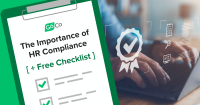HR's Guide to Payroll Compliance in 2025 [+ Checklist]
Payroll can be one of the most stressful aspects of HR administration - this guide is here to help you make sense of payroll compliance.
by Anna Coucke - January 8th, 2025
The Importance of Payroll Compliance
Payroll can be one of the most stressful aspects of HR administration. From ensuring everyone is correctly classified to managing requirements like overtime, holiday pay, and hazard pay, it’s no wonder mistakes are common.
Given the consequences, employers can’t afford to make mistakes in this area. Payroll mistakes — such as not paying employees overtime — will result in fines from the federal and state governments. Payroll mistakes or withheld wages and overtime also demoralize staff and can lead to litigation, such as the $13.2 million recently paid to Alabama steelworkers for unpaid wages and overtime.
This article is intended to provide a general overview of payroll compliance and has been updated to include changes being made in 2025. However, because payroll is governed by the federal and state governments, it is a good idea to do further research on requirements in your state and industry. This article isn’t intended to be exhaustive or provide legal advice.
Download the 2025 HR Compliance Calendar
Check out HR's Guide to Compliance to learn about more compliance issues.
Federal Income Tax
Employers must withhold a variety of taxes from each employee’s paycheck. The amount is determined by IRS-specified methods, either by bracket or percentage, and based on the exemption statuses indicated on the W-4. The amount withheld is reported to the IRS and the employee.
FICA and FUTA Tax
Federal Insurance Contributions Act taxes (FICA) and federal unemployment taxes (FUTA) are required. While employees also contribute to FICA, FUTA is paid solely by the employer on a quarterly basis. FICA taxes are deposited based on the pay schedule but are also reported on a quarterly basis.
State Unemployment Tax Act (SUTA)
Separate from FUTA, the State Unemployment Tax Act (SUTA) is a state program funded by taxes paid by employers. This tax goes towards unemployment benefits for workers who lose their jobs. Since each state has different SUTA programs, check your state's SUTA tax rate and rules on reporting employee wages.
Employee Benefits
According to the IRS, “Any fringe benefit is taxable and must be included in the recipient’s pay unless the law specifically excludes it.” Fringe benefits include typical benefits such as retirement and insurance plans, along with additional benefits such as:
Relocation expenses
Mileage reimbursement
Tuition assistance
Housing stipends
Stock options
Company-provided meals
Work clothing reimbursements
Employee Classification
Classifying workers correctly as either contractors, exempt employees, or non-exempt employees is critical, but it is often not done correctly, with an estimated 30% of companies currently having misclassified employees. Employers must ensure that their employees are properly classified so that the correct tax rules are applied to their pay and deductions. Here are the classifications to keep in mind:
Employee vs. Contractor
First, it is vital to understand the difference between an employee and a contractor.
Contractor: A contractor is someone who is hired to complete a specific project or service for a company but is considered self-employed. Contractors typically have control over their own schedules and are not provided a salary or benefits by a company.
Employee: An employee is someone who works for a company under an agreement (written or spoken) where the company has control over their work. This control can include their schedule, working hours, duties, and responsibilities. In exchange for their work, employees are paid a regular paycheck at a set salary or hourly rate, and typically receive benefits such as health insurance, paid time off, and retirement. Employees can be further classified as exempt or non-exempt.
Exempt Employees
As the implies, these employees are exempt from certain provisions of the Fair Labor Standards Act (FLSA); namely, minimum wage and overtime pay. Exempt employees are typically paid a fixed salary every pay period and are not eligible for overtime pay if they make more than the minimum set by the Department of Labor (DOL).
The minimum annual salary that exempt employees must make to be ineligible for overtime pay was recently changed on July 1, 2024 with the passing of the DOL's Final Rule that raises the minimum salary on a regular basis for exempt employees who meet the applicable duties test:
July 1, 2024: The minimum salary was raised to $43,888
January 1, 2025: The minimum salary will be raised to $58,656
After January 1, 2025, the minimum salary will be raised every 3 years.
Non-Exempt Employees
Non-exempt employees are paid an hourly wage rather than a set salary and must be paid overtime for working extra hours. Under the Fair Labor Standards Act, most employees are non-exempt, which means they must be paid at least the minimum wage for every hour they work, and they receive extra pay (typically one and a half times their regular hourly rate)for working more than 40 hours in a week.
FLSA Law
The Fair Labor Standards Act governs overtime and minimum wage - stating that employers are responsible for abiding by the minimum wage, paying overtime, and following child labor standards for workers under 18. This is also where exempt vs. non-exempt comes in - as most exempt employees are not entitled to overtime if their salary is above a certain threshold.
Minimum Wage
The federal minimum wage for hourly employees is currently $7.25 an hour, however, many states and cities have enacted their own minimum wage laws that override this federal minimum wage. Be sure to research your state and city to ensure your company is compliant with minimum wage laws.
Overtime
Overtime pay is applied to hours worked by non-exempt and eligible exempt employees who work beyond the normal working hours of 40 hours per workweek. For most eligible employees, overtime pay is 1.5 times their normal hourly wage.
Payroll Compliance Checklist
When onboarding a new employee, follow this general checklist of what is needed to set them up correctly in payroll and ensure that calculations are done correctly:
Determine if your new hire is an employee or a contractor.
If they’re an employee, determine if they’re exempt or non-exempt.
Complete the I-9 and W-4.
Add the employee to the payroll system.
Set up direct deposit.
Report new hire information to the state.
Add all necessary information to your internal database.
Retain all employee documents in accordance with state and federal laws.
Although this guide isn’t exhaustive, many payroll solutions — such as GoCo — can help you manage payroll compliance, keep teams aware of upcoming deadlines, and provide critical checklists so that nothing falls through the cracks.
How GoCo Streamlines Payroll
Payroll management is undeniably a stressful and complex aspect of HR administration, especially regarding compliance. Missteps can have serious implications, leading to demoralized staff and potential fines from government entities.
GoCo's embedded payroll software automatically keeps up with compliance changes, automates tax calculations and filing, and allows you to run payroll seamlessly. Our payroll grid automatically flags errors and missing information so your payroll is processed accurately, and tax and benefits withholdings for employees are calculated and handled automatically for you – giving you peace of mind each pay period.
Want to see how GoCo can streamline your payroll (and much more)? Take a free interactive tour of our platform today!
FAQs
-
Payroll compliance involves following all the relevant federal, state, and local laws and regulations that govern how you pay your employees. This includes things like minimum wage, overtime, taxes, and deductions.
-
The most common payroll-related mistakes are:
- Misclassifying employees as contractors
- MIsclassifying employees as exempt or non-exempt
- Not paying overtime correctly
- Not withholding federal and state taxes correctly
- Missing deadlines for taxes
- Inaccurate recordkeeping of employee documents
-
Consequences of non-compliance can include:
- penalties and fines from the government
- interest on unpaid taxes
- litigation from not paying employees correctly
- disgruntled and demoralized staff
- reputational damage to the company
-
- Federal Income Tax: Employers must withhold federal income tax from employee paychecks based on their W-4 form.
- Social Security and Medicare Taxes (FICA): Both employers and employees contribute a percentage of wages to Social Security and Medicare.
- Federal Unemployment Tax Act (FUTA) and State Unemployment Tax Act (SUTA): Employers pay a tax to fund unemployment benefits.
Updated 01/8/2025
Recommended Posts
Search...
Product
GoCo
Resources
Articles
eBooks
Webinars
Customer Stories





